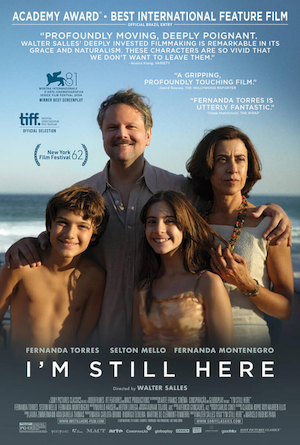 (not to be confused with the one where Joaquin Phoenix raps)
(not to be confused with the one where Joaquin Phoenix raps)
Last Saturday morning I was stressing about the situation – the billionaire gremlin coup and dismantling of society that is happening before our eyes with only measured pushback – and it was too much. I had to make myself stop thinking about it. I want to stay aware, but I have to take care of myself mentally, I can’t spend every day dwelling on catastrophes that I’m powerless against. It’s the weekend, I told myself. It’s a nice day, and I’m seeing a movie, the last best picture nominee I haven’t seen…
But the movie was I’M STILL HERE (Ainda Estou Aqui), about a family dealing with their patriarch being disappeared by the Brazilian government in 1971, and I couldn’t help but come out thinking that’s gonna be us very soon. I hope that’s just the doom and gloom talking, but I have zero doubt that Musk and Trump would love to have this kind of stuff done in their names, that more than enough cops and soldiers would be on board (or would sign up just to do the honors), that not one Republican would raise one finger even one time to do one tenth of jack shit about it, and that Democrats or laws wouldn’t be adequate to stop them. So… signs point to bad, and my morale did not improve that day.
The movie is great, though, and maybe not what you expect. Directed by Walter Salles (CENTRAL STATION, THE MOTORCYCLE DIARES, DARK WATER remake), it opens with the deeply unsettling juxtaposition of a title saying “Rio de Janeiro, 1970, Military Dictatorship,” and a bunch of beautiful people in a beautiful place having a great time. Teens are playing beach volleyball, a dog keeps getting in the way, so they hand him off to little brother Marcelo (Guilherme Silveira), who shows him off to his friends, and then their bare feet pitter patter off the sand across the street, to the house to ask his dad, Rubens Paiva (Selton Mello, upcoming ANACONDA movie?) if they can keep him. He’s in an important meeting in his office and their lovable maid Zezé (Pri Helena) begs the kid not to interrupt, but luckily Rubens is just as charmed by the mutt as everybody else, and even gives him a name.
The Paivas are obviously well off, a big family in an amazing house in Leblon, lots of friends, parties, traditions, shelves full of books, a love of listening to, dancing to, lip syncing to records. The teens go to the movies, or say they do, maybe just hang out, smoke joints, listen to music, mess around with their 8mm camera. Yeah, it’s a military dictatorship, but you can still have long hair, hate The Man, have fun with your friends, be a rebel. There’s a scene in a record store and one of the albums I noticed was Gil Scott-Heron’s Pieces of a Man. American movies have this library of songs that represent specific eras of the 20th century, they become cliches, it’s so cool to hear some great Brazilian rock songs here. I don’t know them, probly never heard them before in my life, but the guitar fuzz and the general attitude make the same point.
(The song I’m thinking of might be by Os Mutantes, by the way. They have a song listed and they’re mentioned in dialogue. I watched some of their set at Bumbershoot years ago so maybe I have heard the song. Anyway, it really works here.)
 Life is good but everybody is worried – revolutionaries have been kidnapping diplomats, who knows how the government will react, but it won’t be peacefully. Sometimes the family sees military helicopters flying overhead or trucks full of soldiers ominously rolling through their beach community on the way to who knows where. A sudden minute of your heart beating out of control in your chest, then back to what you were doing. One day Vera (Valentina Herszage, KILL ME PLEASE) – sometimes called Veroca – comes home late from seeing BLOW UP. Her and her friends got stopped at a military checkpoint, guns pointed at them, yelled at and called hippies, it was fucking scary. Her parents are worried because she’s getting very political at this age, and that could get her into trouble these days. They convince her to move to London with their friends Fernando (Charles Fricks, ELITE SQUAD 2: THE ENEMY WITHIN) and Dalva (Maeve Jinkings), who are concerned enough to close down their book store and publishing house to flee the country. Rubens swears they’ll be back in a couple years. I didn’t understand at first that Rubens is a former Congressman, ousted, exiled, returned as a civilian. He thinks it’ll get better.
Life is good but everybody is worried – revolutionaries have been kidnapping diplomats, who knows how the government will react, but it won’t be peacefully. Sometimes the family sees military helicopters flying overhead or trucks full of soldiers ominously rolling through their beach community on the way to who knows where. A sudden minute of your heart beating out of control in your chest, then back to what you were doing. One day Vera (Valentina Herszage, KILL ME PLEASE) – sometimes called Veroca – comes home late from seeing BLOW UP. Her and her friends got stopped at a military checkpoint, guns pointed at them, yelled at and called hippies, it was fucking scary. Her parents are worried because she’s getting very political at this age, and that could get her into trouble these days. They convince her to move to London with their friends Fernando (Charles Fricks, ELITE SQUAD 2: THE ENEMY WITHIN) and Dalva (Maeve Jinkings), who are concerned enough to close down their book store and publishing house to flee the country. Rubens swears they’ll be back in a couple years. I didn’t understand at first that Rubens is a former Congressman, ousted, exiled, returned as a civilian. He thinks it’ll get better.
I gathered that this was a true story, but I didn’t know until the credits that it’s based on the memoir of Marcelo, who grew up to be a famous author, playwright and screenwriter. But that explains why it starts out with the memory of finding the dog, and why it so vividly captures the image of the father they all loved – a big guy, handsome, mischievous, always ready to take a break from his serious work to show his love for the kids, and make them laugh. When you hear what the movie is about you might picture a grim issue drama, but that’s not really what this is. It focuses somewhat on what was done to them, but more than that on what was taken from them. Of course, spending so much time on the Paivas as people living their lives – Dad putting on a song the kids think is lame at a party, or defending his foosball championship from Marcelo late at night and waking everybody up with his color commentary – makes the other part all the more devastating.
Though it’s Marcelo’s telling, it’s not all from a child’s perspective – in fact the central character is their mother Eunice, played by Fernanda Torres (THE HOUSE OF SAND), who has rightly received acclaim, a Golden Globe and an Oscar nomination for Best Actress (alongside the movie’s nominations for Best Picture and Best International Feature). Her performance is more about sturdy, quiet strength than the fiery emotion that often receives this kind of attention. We watch Eunice trying to stay calm and polite with authorities, and wrestling her fear and grief to keep a strong face for the kids, but without ever giving in. That begins the day of the arrest, when scary not-cops are in the house with them all day staring them down and not answering questions. She doesn’t let the kids know anything unusual is going on. Then she and her oldest-still-at-home daughter Eliana (Luiza Kosovski, SICK SICK SICK) are also arrested and questioned, transported with bags over their heads, seeing and hearing terrifying things around them, refused any information about each other or Rubens. When Eunice gets out she learns that her husband was in fact keeping secrets from her, but not bad ones. Just the things you have to keep secret when horrible people are in power, doing horrible things.
It’s not a story of twists or climaxes or satisfying resolutions. It’s more a document of resilience, of one family, and particularly one woman, surviving the worst, demanding the truth, doing good in the world, outliving the regime, somehow retaining love and hope and good memories through it all. May we all.


























February 13th, 2025 at 10:50 am
This sounds like a tough watch. But if you liked this, I also recommend QUO VADIS, AIDA? which is about genocide in Bosnia in 1995. It also follows a woman as she tries to protect her people and her family, coming up against cruelty and cowardice at every turn. A world where your neighbors smile politely as they lead you to your death, and the people who are supposed to help make excuses. Bleak and unfortunately relatable.